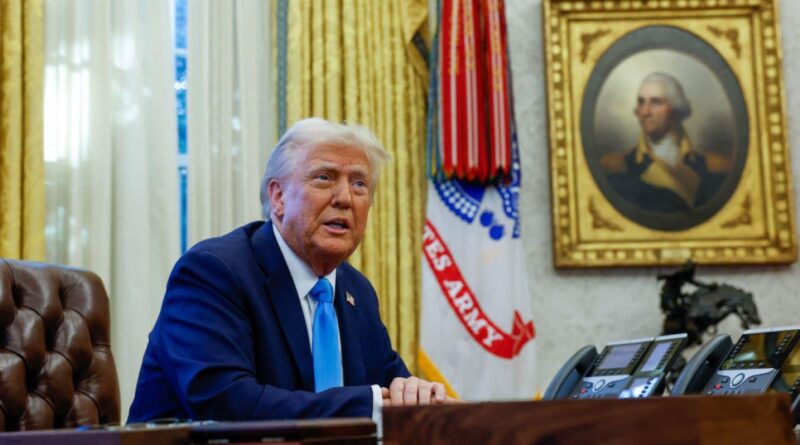Trump’s birthright citizenship order blocked by Maryland and Washington judges
Washington — A day after a federal judge in Maryland temporarily blocked President Trump’s executive order seeking to end birthright citizenship from taking effect nationwide, a federal judge in Washington ruled against the president amid a rush of legal challenges to his directive.
U.S. District Judge John Coughenour said during a court hearing on Thursday that he would issue a preliminary injunction blocking the president’s order that was sought by a group of four Democrat-led states.
“It is clearly unconstitutional,” Coughenour said of Mr. Trump’s directive. “The preliminary injunction is granted on a nationwide basis.”
The judge said birthright citizenship is a “fundamental” constitutional right.
“In this courtroom and under my law, the rule of law is a bright beacon that I intend to follow … I refuse to let that beacon go dark today,” Coughenour, a Ronald Reagan appointee, said.
In a 13-page decision, the judge wrote that the states are likely to succeed on their claim that the birthright citizenship order is unconstitutional.
“Citizenship by birth is an unequivocal constitutional right. It is one of the principles that makes the United States the great nation that it is,” he said. “The president cannot change, limit or qualify this constitutional right via an executive order.”
The judge’s order comes one day after U.S. District Judge Deborah Boardman, appointed by former President Joe Biden, agreed to grant a preliminary injunction sought by immigrants-rights groups after conducting a hearing on the request. The organizations, led by Maryland-based CASA and the Asylum Seeker Advocacy Project, filed a lawsuit arguing Mr. Trump’s executive order targeting birthright citizenship violates the Constitution and federal law.
In a 32-page opinion, Boardman wrote that Mr. Trump’s order interprets the Constitution’s Citizenship Clause “in a manner that the Supreme Court has resoundingly rejected and no court in the country has ever endorsed.”
“The president’s novel interpretation of the Citizenship Clause contradicts the plain language of the Fourteenth Amendment and conflicts with 125-year-old binding Supreme Court precedent,” she wrote.
The judge said that when children who would be covered by Mr. Trump’s order are born, they will be U.S. citizens under the 14th Amendment and Supreme Court precedent. If the president’s order remains in place, she wrote, children born in the U.S. subject to it will be denied the benefits and rights of U.S. citizenship.
“The president does not have the authority to strip them of their constitutional right to citizenship by birth,” she wrote.
The groups challenging Mr. Trump’s order on birthright citizenship cheered the judge’s decision.
“This is a victory for our families, for our country, and for the Constitution of the United States. This is the level of fight that will be required for the next four years of the Trump administration,” George Escobar, chief of Programs and Services of CASA, one of the groups that challenged the order, said. “The pregnant women who took this case up against President Trump — and so many immigrants across the country — can breathe easier knowing that their precious children are citizens and afforded the full rights that come with that.”
The suit brought in Maryland is one of at least eight that were filed in courts from coast to coast soon after Mr. Trump signed the order on his first day in office. Entitled “Protecting the Meaning and Value of American Citizenship,” the directive denies U.S. citizenship to children born to mothers who are in the country unlawfully or temporarily on visas, and whose fathers are neither citizens nor lawful residents.
The immigrants-rights’ groups are suing alongside five women who are pregnant and live in the U.S. They now fear their children will be denied U.S. citizenship because of their immigration status and that of their fathers, according to the filing.
“Every day, babies are being born in the United States whose constitutionally guaranteed citizenship will be called into doubt under the Executive Order,” they wrote in their suit.
Swapna Reddy, co-executive director of the Asylum Seeker Advocacy Project, said the court’s decision was the right one and warned that Mr. Trump’s executive order “has created chaos for so many families, including ASAP members, who are scared their children will not be able to live a life free of fear in the only country they will have ever known.”
The groups are being represented by the Institute for Constitutional Advocacy and Protection at the Georgetown University Law Center.
Boardman was not the first judge to block Mr. Trump’s birthright citizenship order. Coughenour halted its enforcement last month in the case brought by Washington, Arizona, Illinois and Oregon while he considered a request for a preliminary injunction.
Coughenour, who sits on the federal district court in Seattle, initially issued a 14-day temporary restraining order to remain in place while he considered a request for a preliminary injunction and called Mr. Trump’s directive on birthright citizenship “blatantly unconstitutional.”
contributed to this report.

